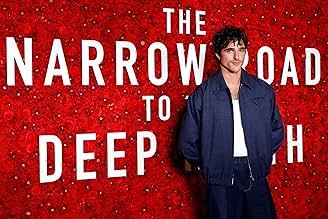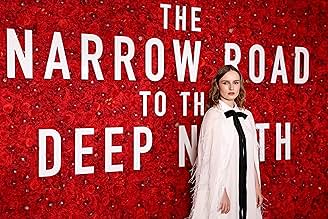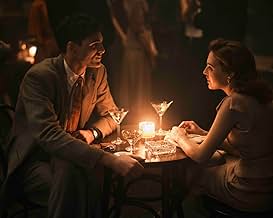Burma Railway in 1943 and across the Pacific during World War II, charts the cruelty of war, the tenuousness of life and the impossibility of love, as seen through the eyes of an Australian ... Read allBurma Railway in 1943 and across the Pacific during World War II, charts the cruelty of war, the tenuousness of life and the impossibility of love, as seen through the eyes of an Australian doctor and prisoner of war.Burma Railway in 1943 and across the Pacific during World War II, charts the cruelty of war, the tenuousness of life and the impossibility of love, as seen through the eyes of an Australian doctor and prisoner of war.
- Awards
- 1 nomination total
Browse episodes
Featured reviews
I agree with comments by other reviewers about the dark murky lighting on parts of the series. I know the intent is to create atmosphere but possibly taken too far. The three timelines were also a bit confusing especially as the two main female characters resembled each other in the early episodes. However, those are small quibbles. This is one of the better series I have seen. A compelling story which stays with you for a long time. The acting was superb. There are scenes which are difficult to watch because they are brutal. Not for the squeamish. An important time in history which poses questions relevant today.
Had high expectations, but was very disappointed. The misty, murky photography made it hard to watch and I gave up. The lead actor mumbles his way through the episodes and Ciarin Hind's Aussie accent is even worse, and he too mumbles. The producer should have hired someone who knew how Aussies spoke in 1941, because they certainly did not call a dinner jacket , a tuxedo, nor say hi in a formal setting. I know the series is based on a book, which I have not read, but the movie, Bridge on the River Kwai was better and if you want to know about the hardships suffered by Aussies in Japanese POW camps, read about Sir Weary Dunlop.
This miniseries just creeps up on you. The love entanglements and pre war backstory can be a bit confusing; Then episode 4 drops on you, and you are just blown away.
This should be one of those success stories of a little known, under marketed miniseries that came out of nowhere. But the right people take notice and it spreads like the virus it deserves to be.
It is a story about how humans can treat each other, and how the lead characters traumatic experience haunts him later in life despite his clearly major success. While it's fictional I'm sure the atrocities are based on fact. Episode 4 is truly harrowing. If you enjoyed the Pacific or Band of Brothers for its exposure of the inhumanity and futility of war - this will be a real treat.
It's haunting and makes you think. It sticks in your mind. My hope is that in 6 months from now people will be raving about this and it will garner the awards and recognition it deserves.
This should be one of those success stories of a little known, under marketed miniseries that came out of nowhere. But the right people take notice and it spreads like the virus it deserves to be.
It is a story about how humans can treat each other, and how the lead characters traumatic experience haunts him later in life despite his clearly major success. While it's fictional I'm sure the atrocities are based on fact. Episode 4 is truly harrowing. If you enjoyed the Pacific or Band of Brothers for its exposure of the inhumanity and futility of war - this will be a real treat.
It's haunting and makes you think. It sticks in your mind. My hope is that in 6 months from now people will be raving about this and it will garner the awards and recognition it deserves.
You can rarely see a good series or movie from the australian perspective. It's a short series but keeps you engaged at almost every scene. The brutality of the japanese or the POW struggling for survival really comes through the screen on an emotional level.
I would say it's a unique World War 2 series, can't put it in a category. It's not really about the war but how we humans sometimes lack the humanity, emphaty or the communication so we could understand each other. When we can't communicate or express ourselves then we just move on instead repairing the thing that brings us the most joy or even who brings us the most love.
A must watch for anyone who enjoys war series with less action and more emphasis on the emotional and personal struggles for both the character and You, the viewer.
I would say it's a unique World War 2 series, can't put it in a category. It's not really about the war but how we humans sometimes lack the humanity, emphaty or the communication so we could understand each other. When we can't communicate or express ourselves then we just move on instead repairing the thing that brings us the most joy or even who brings us the most love.
A must watch for anyone who enjoys war series with less action and more emphasis on the emotional and personal struggles for both the character and You, the viewer.
In response of some critics about... The cinematography is one of the best I've ever seen. Mist, darkness, murkiness... it feels like material heaviness... rain, mud, humidity... It's so rare to 'feel' the visual in contemporay cinema... It is the meaing of the supersensible, synaesthetic overtones that Ejzenstejn spoke of, perfectly reproduced with digital tools. As for the plot: the first two episodes are absolutely solid and convincing. Kurzel proves to be one of the most prepared directors, in the name of a certain incandescent naturalism that borders on material evocation, as already underlined. TV at its best.
Did you know
- TriviaThe last survivor of those that built the railway died in January 2024.
- How many seasons does The Narrow Road to the Deep North have?Powered by Alexa
Details
Contribute to this page
Suggest an edit or add missing content










































